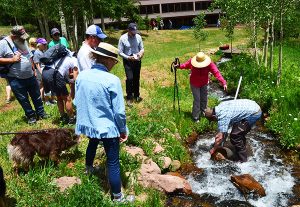by Carol Dunn
GARDNER- Water attorney Jim Felt and 25 other people attended the Huerfano County Water Conservancy District meeting on January 26 to seek remedies to a water crisis in Gardner. According to Felt, the Gardner Water and Sanitation District (GWSD) has been extracting water from wells for municipal use, a “junior” water use that has diminished the flow of the Huerfano River to downstream owners of senior water rights. Until six months ago, Gardner had been replacing, or augmenting, this out-of-priority consumptive use by leasing transmountain water rights from Wolf Springs Ranch, through the Arkansas Groundwater Users Association (AGUA), a private non-profit organization.
According to Steve Witte, Division 2 Water Engineer, Gardner’s use of the wells became an issue in 1996 when the Office of the State Engineer began administering wells. When the AGUA lease expired six months ago, GWSD knew it had to find another source of augmentation, but that has not been accomplished to date.
On Feb. 12, Water Court Judge Maes will decide Gardner’s case, which involves 52 water taps, the Malachite Spring, and seven acre-feet of water. “You will see people moving out of Gardner if this isn’t resolved,” said Kent Mace, who maintains the Malachite Spring. One Gardner resident added, “They could shut off the school and the fire department.”
Felt described a possible scenario as growth increases in the County. In each situation where a subdivision is using water out of priority, water rights will need to be purchased and an augmentation plan approved in water court. The result could be numerous entities buying “pieces of water” to augment their consumptive use, followed by possible objections to their augmentation plan, thus burning up resources to defend their augmentation plans in court.
Felt said that a water conservancy district is ideal to control this process so the use of the water will not injure other water rights owners. He named water conservancy districts in Colorado which are now managing the integrity of the water rights priority system through blanket augmentation plans.
Both Felt and Witte suggested that eventually a blanket augmentation plan developed by the local water conservancy district would be a long-term solution to the water situation in Huerfano County. Grady Grissom, new co-owner of Sheep Mountain Ranch, told the crowd, “These communities have healthy land and water. The water we have is a commodity, an asset to our community.”
Raymond Harriman, chair of the water conservancy district board pointed out, “This is a small district. We have a small budget, and we haven’t de-Bruced. How could we afford to do something like this?”
Felt said a substitute water supply plan, using water rights leases and supported by Witte’s office, needs to be filed right away. That would take care of Gardner’s immediate crisis. He suggested that grants and other funding sources could be pursued in the next year, and then the district could establish an enterprise to manage water rights transfers. The enterprise, a business venture, would not require an election to de-Bruce, or remove Tabor restrictions on the district’s budget. John Galusha, Huerfano County Administrator, offered his grant-writing services to the district, with an approving nod from County Commissioner Roger Cain.
Harriman told the group, since two district board members were not present, no decision would be made that evening. The entire water conservancy district board will take up the matter and decide what they can do to help. A special meeting to further discuss the situation will be held Feb. 4 at 6 p.m. in the Commissioners board room at the County Courthouse.




